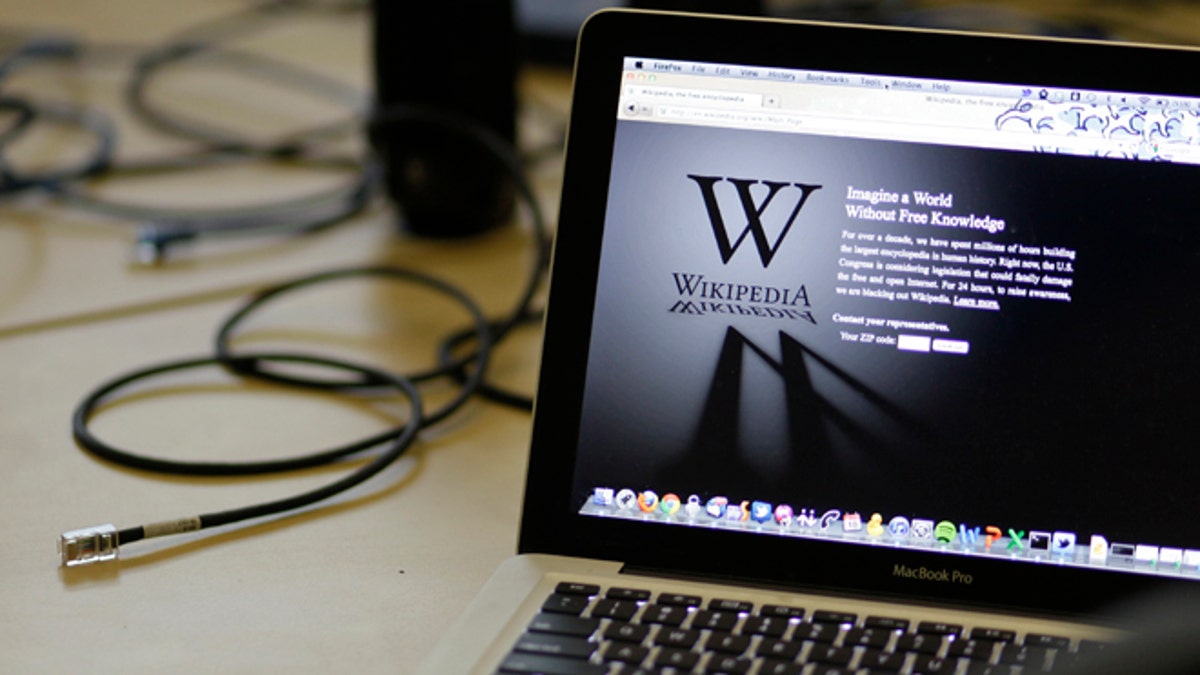
Jan. 18, 2012: A blackout landing page is displayed on a laptop computer screen to protest the SOPA legislation -- which some argue is returning under a new name. (AP Photo/Eric Risberg)
Industry groups attempted to corral the growing Internet protest against a proposed cybersecurity bill Monday, announcing what could spell tweaks to the wording of a bill that some call far too vague -- and a real threat to online privacy.
The Business Software Alliance and the Center for Democracy and Technology met Monday, Apr. 16, to discuss the Cyber Intelligence Sharing and Protection Act (CISPA), a new bill intended to regulate the flow of information online and make it easier for the government to communicate with companies in the event of a cyber threat.
“We agreed that the definition of what constitutes cyber threat information could benefit from sharpening,” the software alliance said in a statement. “We also discussed clarifying limitations on how threat information will be handled and used by government.”
'CISPA is likely to lead to expansion of the government’s role in the monitoring of private communications.'
Cyberwatchdogs may be slow to accept such tweaks, on the cusp of Stop Cyber Spying Week, an Internet-wide protest launched Monday leading up to the Apr. 23 vote on CISPA (HR 3523).
They argue that the bill itself is the real cyber threat.
“CISPA is likely to lead to expansion of the government’s role in the monitoring of private communications,” warned the Center for Democracy and Technology, and “is likely to shift control of government cybersecurity efforts from civilian agencies to the military.”
The Electronic Freedom Foundation and Reporters Without Borders agree, the later noting that this bill sacrifices freedom of expression and the protection of online privacy “in the interests of national security or copyright.”
CISPA is sponsored by Rep. Mike Rogers, R-Mich.., and Rep. C.A. Ruppersberger, D-Md. They claim it’s meant to prohibit Washington from forcing private companies to hand over information and to help American businesses protect their computer networks and intellectual property from cyber attacks.
And unlike the widely maligned SOPA legislation -- a bill meant to stop online privacy that led many sites to threaten Internet blackouts in protest -- CISPA has many backers, including Microsoft and Facebook.
“HR 3523 would impose no new obligations on us to share data with anyone,” wrote Joel Kaplan, vice president-U.S. Public Policy for Facebook. “And it ensures that if we do share data about specific cyber threats, we are able to continue to safeguard our users’ private information, just as we do today.”
The Electronic Freedom Foundation begs to differ.
“Kaplan assured users that Facebook has 'no intention' of sharing private user data with the government,” wrote Rainey Reitman, activism director with the not-for-profit watchdog group.
“But let’s be clear: Internet users don’t want promises from companies … we want strong laws that make such egregious privacy violations illegal.”








































